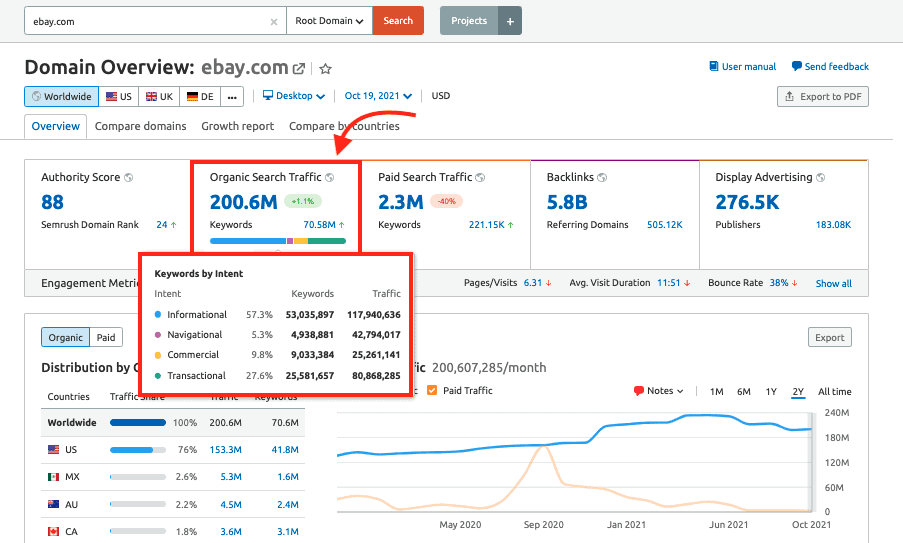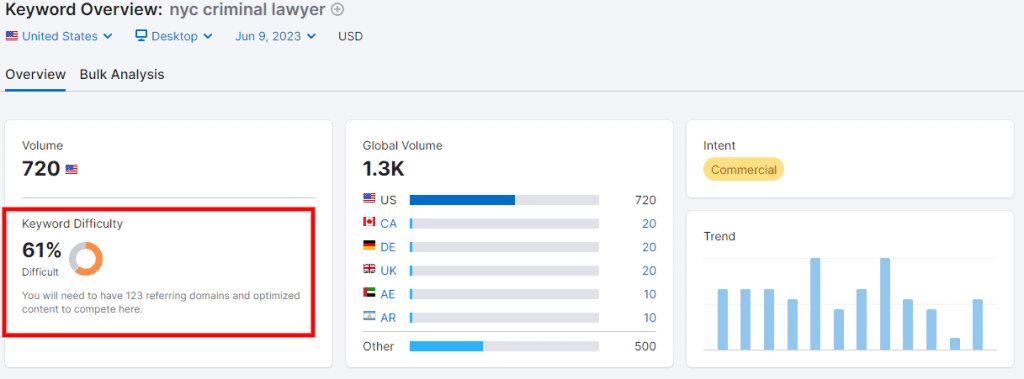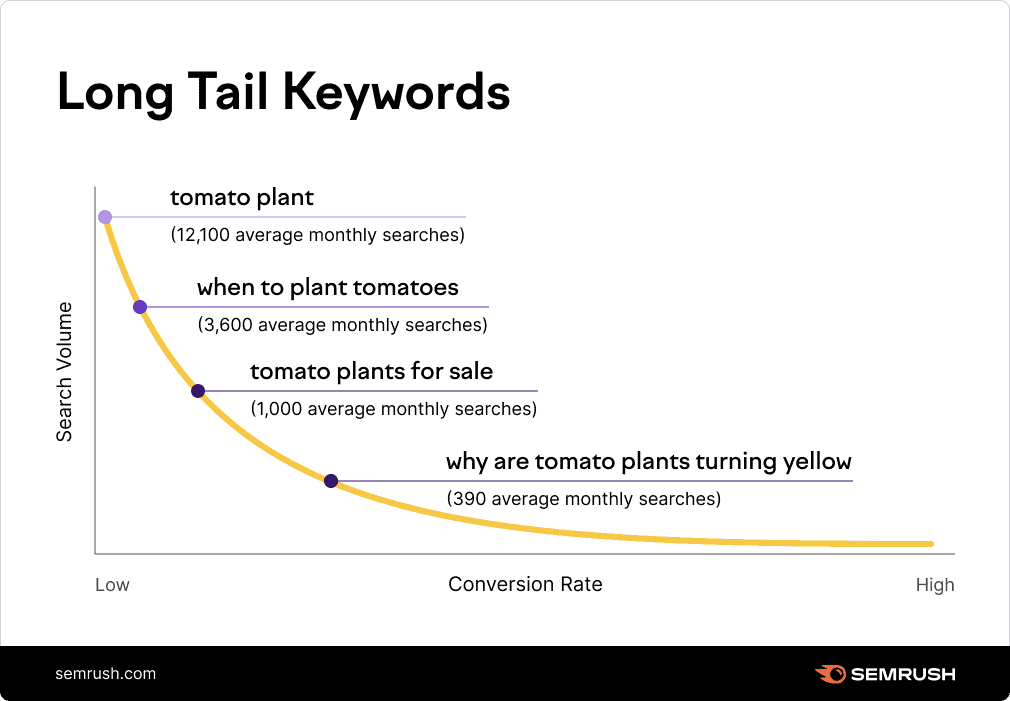Looking to get started with local keyword research? You’ve come to the right place. Keyword research for local SEO (search engine optimization) is the foundation behind any local digital marketing strategy—but it can be downright challenging if you don’t know where to start.
We won’t beat around the bush: creating content for a local audience is difficult and time-consuming. However, it’s oh-so-worth the investment.
Local SEO keyword research is an essential part of this process. It helps you understand your audience and their queries and informs your content marketing strategy from the ground up.
Search engines want to show your customers the best, most relevant content—but they need you to follow best practices so they can do the rest.
Below, we’ll walk you through the process of local keyword research, with tips on identifying and utilizing relevant keywords to optimize your content for local audiences.
What Is Local SEO Keyword Research?
Local SEO has become an essential aspect of online marketing, and appearing in local search results can make a world of difference for local businesses targeting a specific geographic area.
Local keyword research involves identifying the search terms and phrases that local users commonly use to find products, services, or information related to a particular location.
By understanding the language and intent behind local searches, businesses can optimize their online presence to align with the needs and expectations of their local audience.
Why Is Local SEO Keyword Research Important?

Local keyword research is crucial for a variety of reasons:
- Understanding customers’ preferences, needs, and pain points specific to a particular location
- Outranking your competitors in local search results
- Creating relevant content that resonates with a local audience
- Increasing visibility and attracting more potential customers
- Improving engagement and conversion rates
How to Start Local Keyword Research

If you’re looking to get started with your own local keyword research, there are tons of resources and tools you can leverage.
Some of the best keyword research tools provide additional keyword suggestions, search volume data, and competition analysis specific to a particular location.
Below are some of the best in the business:
- Moz Local
- Semrush
- Ahrefs
These keyword research tools can help you as a marketer or business owners to identify valuable keywords with high search volume but low competition, allowing you to optimize content for maximum visibility.
Another underrated resource to use for local keyword research is Google My Business (GMB). The insights section of GMB offers valuable data on the Google search terms people use to find a business, allowing you to further drill down on your keyword research efforts.
Lastly, online directories and review sites specific to a business’s location are also valuable sources for local keyword research. These platforms often have search functionality that allows local businesses to discover popular keywords related to their industry and location. For instance, a hotel in San Francisco might find relevant keywords by exploring travel websites or review platforms where users frequently search for accommodations in the city.
Local Search Intent: Your Secret Weapon
Plenty of “experts” will give you keywords they pulled out of a tool with no critical thinking attached.
But, you don’t want to rank for just any ol’ keyword—you want to find local keywords that potential customers use with specific intent.
To really nail the finer points of local keyword research, it’s crucial to understand the search intent behind local queries. Search intent refers to the motivation or purpose behind a user’s search when seeking products, services, or information. Local search intent is when they’re searching within a specific location.
Analyzing user behavior and Google search queries can provide valuable insights into the intent behind local searches.

Google offers a couple of free tools to help you identify local search intent:
Google Trends allows businesses to explore the popularity of specific Google search terms in different locations, providing a glimpse into what people in a particular area are searching for.
Google’s Keyword Planner is another helpful tool that can provide keyword suggestions and search volume data specific to a particular location.
By understanding the intent behind local searches, you can tailor the content of your businesses website to meet the needs of its target audience.
For example, if a business is a restaurant in New York City, you may discover that people in the area frequently search for terms like “best pizza in NYC” or “top-rated restaurants in Manhattan.”
Armed with this knowledge, you can create content that directly addresses these queries, like product pages highlighting the different pizza specialties or a landing page showcasing your restaurant’s unique differentiators.
How to Analyze Your Keyword Competition

Once you’ve compiled a list of potential local keywords, it’s crucial to assess the competition associated with each keyword. Evaluating keyword competition will help you understand the difficulty you face in ranking for a particular keyword.
One way to assess keyword competition is by examining the websites that currently rank highly for the target keywords in local search results. Analyze their content, backlink profiles, and overall website authority to determine the level of competition.
If the top-ranking websites are well-established and have a robust online presence, it may indicate high competition for that keyword.
Keyword difficulty tools provided by SEO platforms can also help determine competition. These tools assign a numerical value to represent the difficulty of ranking for a particular keyword, considering factors such as search volume, competition, and backlink profiles.
Aim for keywords with a manageable difficulty level with significant search volume to increase the chances of ranking well in local search results.
Look for Long-Tail Local Keywords

While short, highly competitive keywords are important for local SEO, focusing on long-tail local keywords is equally essential. Long-tail keywords are longer, more specific phrases that typically have lower search volumes but higher conversion potential.
These keywords often indicate a user who is further along in the buying process and has a clear intention.
For example, a jewelry store in Seattle may find the keyword “engagement rings” highly competitive and challenging to rank for. However, targeting a long-tail local keyword like “custom engagement rings in Seattle” can reach a more specific audience actively seeking their services.
Long-tail local keywords and keyword modifiers provide an opportunity to connect with highly relevant and motivated users, leading to better conversion rates.
How to Strategically Use Local Keywords
Once you’ve identified your target keywords, it’s crucial to incorporate them strategically throughout your website and additional digital assets. Here are some critical areas for local keyword optimization:
On-page optimization: Optimize the meta titles, meta descriptions, headings, and content of your website’s pages to include relevant local keywords. Ensure that the keywords flow naturally within the content and provide value to the reader.
Local business listings: Optimize your business listings on directories, review sites, and social media platforms by including your target keywords in the business name, description, and other relevant fields.
Google My Business: Make sure your GMB listing is complete and up-to-date, including your business name, address, phone number, and website URL. Incorporate local keywords naturally within your business description to improve your visibility in local search results.
Content creation: Develop high-quality, informative, and engaging content that incorporates local keywords naturally. This can include blog posts, articles, guides, and FAQs that address your local audience’s specific needs and interests.
Location pages: Create dedicated landing pages for different locations you serve. Optimize these pages with localized content, including local keywords, testimonials from customers in that area, and relevant information about the location.
While optimizing for local keywords is important, it should not compromise the overall user experience. Ensure your content remains valuable, informative, and engaging to your audience while incorporating the keywords seamlessly.
Tracking and Refining Your Local Keyword Strategy

Monitoring and analyzing the performance of your local keyword strategy is essential for ongoing success. Here are some critical steps to track and refine your local keyword strategy:
Local keyword ranking monitoring: Regularly monitor the rankings of your target keywords in search engine results. Utilize SEO tools to track your keyword positions and identify any changes or fluctuations.
Website traffic analysis: Analyze the organic search traffic to your website and identify the sources of that traffic. Pay attention to the geographical data to understand the effectiveness of your local keyword optimization.
Conversion tracking: Set up conversion tracking on your website to measure users’ actions after finding your website through local search. This could include form submissions, phone calls, or purchases.
User engagement analysis: Assess user engagement metrics, such as bounce rate, time on page, and click-through rates, to gauge the effectiveness of your content and its alignment with local search intent.
Competitor analysis: Continuously monitor and analyze the strategies of your competitors in local search. Identify new keywords they may be targeting or strategies they implement to improve their local SEO. Use this information to refine and enhance your local keyword strategy.
Based on the insights gained from tracking and analysis, make necessary adjustments and refinements to your local keyword strategy. This may involve identifying new local keywords, optimizing existing content further, or creating new landing pages targeting specific locations.
Remember that local SEO is an ongoing process, and staying up-to-date with the latest trends and algorithm changes is crucial for maintaining and improving your local search visibility.
Unlock Your Local SEO Potential with BCC Interactive
Local keyword research plays a vital role in the success of your local SEO strategy. It allows you to deeply understand your local audience’s search intent and uncover relevant local keywords that can significantly impact your online presence.
By optimizing your website and content for these keywords, you can attract targeted traffic, surpass your competitors in search engine rankings, and ultimately increase your conversions.
Effective local keyword research requires a comprehensive approach. It involves analyzing user behavior, utilizing tools and resources, and creating optimized content that resonates with your local audience.
This process is not a one-time task but an ongoing effort that requires monitoring performance and continuously refining your strategy to stay ahead in the ever-changing landscape of search engine algorithms.
Are you looking to improve your website’s traffic and revenue from organic search? Don’t have the time or expertise to handle SEO on your own?
Take the next step and book a call with BCC Interactive today. Our team of SEO experts specializes in providing valuable insights and strategies to enhance your online visibility. Schedule your call today and unlock the full potential of your local SEO efforts!

